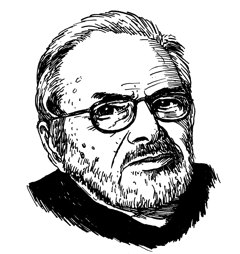I went to see Maurice Sendak last year at his home in Connecticut. The eighty-three-year-old was promoting his latest book, Bumble-Ardy, about an orphaned pig whose ninth-birthday festivities are gate-crashed by teenage swine. He came to the door with his dog, Herman (after Melville), and for the next two hours was everything one might expect him to be: furious, caustic, darkly hilarious, and, above all, warm about life and love and what matters most.
After his death, in May, much was written about Sendak’s legendary crossness, but it was really just impatience with artifice. “I refuse to lie to children,” he said. “I refuse to cater to the bullshit of innocence.” There was no roughness in his delivery. It was spiked with merriment. He was also very tender. Sendak’s memories of his family, the suffering they had gone through during the war, and the effect this had on his development as an artist, still brought him close to tears. He recalled his mother and father as bewildered, hurt people, first-generation immigrants from Poland set at sea in America.
He had been grieving since the death, in 2007, of Eugene Glynn, his partner of fifty years, and was not afraid of dying. He wanted a “yummy death,” he said, in the style of Blake. Famously, he hated being called a “children’s illustrator”—it reduced him, he thought—and while he leaves a body of work that speaks as profoundly to adults as to children, he spared his youngest readers at least one aspect of grown-up heartache. By and large, after their adventures, Sendak’s young heroes get to do something his own family did not get to do, something which Sendak knew to be a more mythical journey than his wildest imaginings, fueled as it was by an unfulfilled yearning: they got to go home.
—Emma Brockes
I. THERE ISN’T ANOTHER KIND OF SEX
THE BELIEVER: Do you miss the city, living out here?
MAURICE SENDAK: I really don’t like the city anymore. You get pushed and harassed and people grope you. It’s too tumultuous. It’s too crazy. I’m afraid of falling over in New York. People are all insane and talking on machines and twittering and twottering. All that. I’m here looking for peace and quiet. A yummy death.
BLVR: A yummy death?
MS: I’m just reading a book about Samuel Palmer and the ancients in England in the 1820s. You were so lucky to have William Blake. He’s lying in bed, he’s dying, and all the young men come—the famous engravers and painters—and he’s lying and dying, and suddenly he jumps up and begins to sing! “Angels, angels!” I don’t know what the song was. And he died a...
You have reached your article limit
Sign up for a digital subscription and continue reading all new issues, plus our entire archives, for just $1.50/month.
Already a subscriber? Sign in





